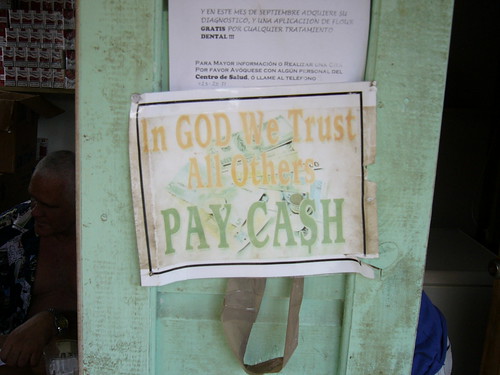The motto “In God We Trust” is on all U.S. currency. It’s fairly common to see signs (especially in New York) that add “all others pay cash.” This is because building trust is essential in business relationships.
Store owners don’t know everyone who walks in off the street. So, they don’t trust them.
Without trust, we just don’t want to take the risk of losing money, or being tricked in some way.
Why is trust important?
That same store owner may change his/her mind if you come in every week (or every day). Once they know and recognize you, they may throw in a extra piece of fruit, or tell you not to worry if you’re a couple of pennies short in change.
The difference is that they now trust you.
Last week, responding to my post (Why People Buy) Josh said,
I believe that there is now a stark difference between those smart copywriters who know just what to say and those friends we have in our personal networks who make a genuine recommendation to help us.
The problem with social networks is that brands are in effect trying to become that trusted friend immediately. They think that because you’ve given them permission to broadcast on your Facebook feed, they are in!
Build trust before you sell
Josh is absolutely right. Many brands try to be your “friend” in situations in which the word “friend” is not terribly accurate. Your real friends are people, not corporations.
Recommendations are great if they come from someone you know well enough and long enough to trust, not the social media manager for a big company. The most effective recommendations are from friendships in “meat space,” or a well-respected authority in the field (Brian Clark on copywriting or Chris Brogan on social media).
Big brands often use celebrities for this reason, hoping that the “glow” from the star will extend to their razors or shampoo or cars.
But do you really know Tiger Woods? Apparently, we didn’t.
Trust leads to more sales
If your readers/fans/subscribers trust you, and trust the recommendations you make, yes, they will buy. Not only because of smart copywriting (though that certainly helps, says the smart copywriter), but because of trust and because of a relationship. If you skip the hard work of building the relationship (and lose the trust) you won’t get the sale.
Before you start friending or becoming a fan, stop and think. Are you starting a conversation, or making a big social media marketing mistake?
Share your thoughts
Do you trust brands on social networks? Would you “friend” Tide or Charmin? What about a less-familiar brand?





